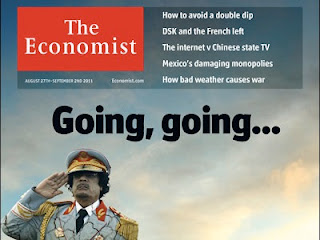
Alan Pritzlaf sent me the following perceptive article on the situation in Libya.
Another dictator in the Middle East is gone, but what will replace him? In the West we don't value history, but we must look at the history of Libya to see what is probably ahead. From 1843 until 1922, Libya was ruled by a radical Islamic group known as the Sanussi, whose founder studied Wahhabi (radical) theology in Saudi Arabia. The Italians occupied the country from 1922 to 1943, when it was liberated by the Allies. After the war the country was turned over to King Idris, a leader of the Sanussi. He ruled as an autocrat until he was overthrown by Qaddafi in 1969.
Libyans therefore have absolutely no experience with anything approaching democracy, and have had much experience with radical Islam. Back in 1995 a Western journalist concluded that "militant Islamists . . . were the best organized threat to his [Qaddafi's] rule." Throughout the rebellion, which started in March, the news media has occasionally noted the presence of people associated with al-Qaeda among the rebels. Last week, during a news broadcast from Libya, I noticed, but the reporter did not, that one of the rebel fighters was wearing an Afghan hat. Where would a Libyan get such a hat? Most likely, either he or one of his friends was an "Arab Afghan," an Arab that went to Afghanistan in the 1980s to help the radical Muslims fight the Soviets. When the Soviets gave up and went home, these "Arab Afghans" also went home and started radical Islamic revolutions in their home countries.
So, who will replace Qaddafi? After a transitional period of several months to perhaps two years, I suspect that a radical Islamic regime will take power. Sharia law will be declared to be in force. The draft constitution being put together by the National Transitional Council already says "Islam is the religion of the State and the principal source of legislation is Islamic Jurisprudence (Sharia)."
Sharia law mandates second class status for women and non-Muslims, and death for those who leave Islam. Soon, Libya will take its place alongside Iran, Sudan and Lebanon as a state ruled by radical Islam. This time we (Americans and Europeans, through NATO) will have had a direct hand in helping it to happen.








